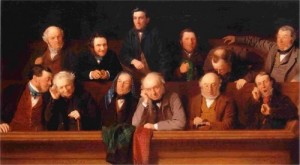 We have a twenty-minute break and wifi in here, so a quick update from the Courthouse.
We have a twenty-minute break and wifi in here, so a quick update from the Courthouse.
My friend Laura M., formerly of San Francisco, now of la jungla somewhere, sent me a note with a link to a very unique take on the responsibilities of jury duty. Over on her personal blog, MTV worker and Carrie Fisher fan Laurel Woods has a recounting of her life experience with jury duty, which included a few random dismissals, and then, later on, having to sit to watch jury selection when her own father went on trial for murder (twist!).
Here’s Woods describing about the next time she was being selected as a potential juror after her father’s conviction:
“Anyone else?” I raised my hand. “My father is serving a life sentence in prison.” Every head in the room turned around to me. The court room had gone silent. I could hear the crickets clear out in the Bayou.
“What is his conviction?” The judge fumbled his words. I paused, “Murder.” Another bomb dropped. People turned their heads around even more, as if they were stretching at the end of a yoga class. “Where is he serving his sentence?” “In California,” I offered. “Do you feel that your father’s conviction will prevent you from being able to give this defendant a fair trial?” “No, I do not.” “Thank you.”
Next the attorneys each had a chance to ask detailed questions. The defense attorney singled me out right away. “Were you involved at all in your dad’s trial?” “Yes.” All of a sudden, I had flashbacks of being cross-examined by the bulldog prosecutor during my dad’s trial. He tore apart every phrase I had uttered in my testimony, trying to put words into my mouth. I had quickly learned to never offer more than what you’re asked.
“Can you elaborate?” She asked. “I sat through my dad’s jury selection, and his trial.” “Every day?” “Yes.” I was visibly shaking. “Did you have to testify?” “Yes.” I could only respond yes or no. “And you still feel that you can give my client a fair trial, given your dad’s situation?” “Yes I do.” “Thank you,” she looked at me unconvincingly.
After both attorneys finished, the judge read out the names to be dismissed. I wanted to be selected more than anything. “Laurel Woods,” my heart sank. Everyone stared at me with a look of sadness. I gathered my things, stood up, and walked out of the court room. Everyone else was trying to get out and I was trying to stay in. I felt rejected and was emotionally exhausted. They’ll never pick me.
So apparently, this is somewhat like disenfranchising ex-cons for life after they serve their time. Only here it’s the family members who will effectively barred from being able to serve on a jury just because of their association with someone who was convicted. I would argue that someone who has been on the other side of the criminal justice system might bring a welcome perspective to the process. After all, in increasingly upmarket Manhattan, our jury looks pretty white and unscarred by life (I include myself in that category). The three randomly-selected jury officers–foreman, assistant foreman and secretary–are a bond trader, pediatric ER doctor, and a patent lawyer, respectively. Not exactly the peers of most of the accused, I’m guessing.
At any rate, I respect Woods’ desire to serve. I wish everyone were more like that.
 Our son’s latest developmental stage involves greeting random people. “Hi!” he says, to us, to store clerks, to ladies on the street. Last night on the way home, reports my wife, he waved and shouted “hi!” to two middle-aged ladies on the steps of a nearby church, and completely flattened them with his cuteness. (As well he should, being that he’s the cutest child on earth.)
Our son’s latest developmental stage involves greeting random people. “Hi!” he says, to us, to store clerks, to ladies on the street. Last night on the way home, reports my wife, he waved and shouted “hi!” to two middle-aged ladies on the steps of a nearby church, and completely flattened them with his cuteness. (As well he should, being that he’s the cutest child on earth.)
